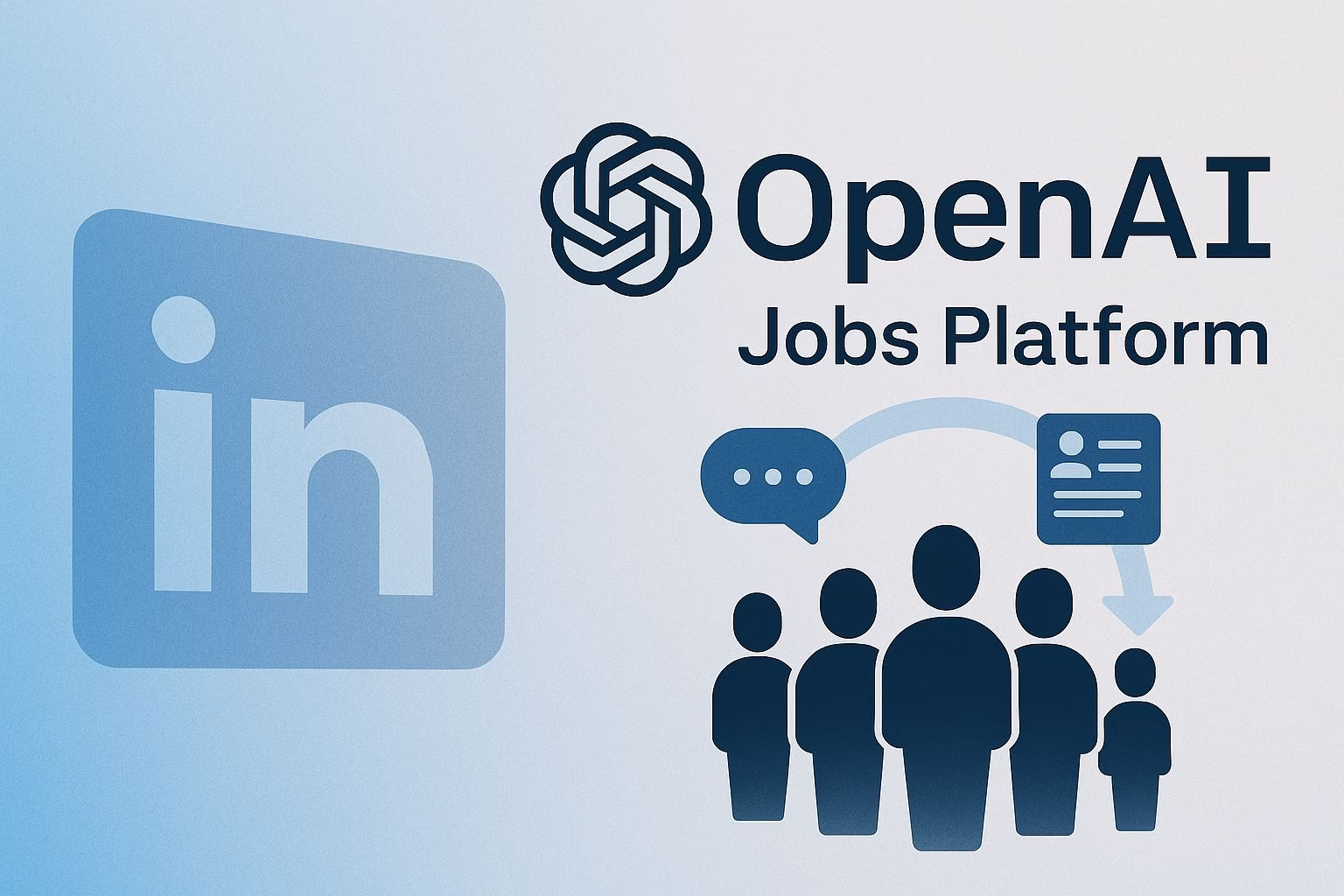OpenAI jobs platform aims to replace LinkedIn in AI hiring
OpenAI is moving beyond building tools and into reshaping the job market.
The company just announced a jobs platform designed to connect businesses with AI-skilled workers, paired with a certification program meant to boost AI fluency across the workforce.
This is more than just another product launch. It signals OpenAI’s ambition to control not only how people use AI, but also how they prove their skills and find work in an AI-driven economy.
For years, LinkedIn has dominated professional hiring. Now, OpenAI seems to believe it can do better, especially in matching talent that understands AI.
What makes this move even more significant is the timing. As debates about automation and displaced jobs grow louder, OpenAI wants to position itself as the company that both disrupts and provides solutions.
Summary
- OpenAI announced a new jobs platform to connect businesses with AI-skilled workers.
- A certification program, built with Walmart, aims to make 10M Americans “AI fluent” by 2030.
- The initiative lines up with White House AI literacy efforts, giving OpenAI political cover.
- This move directly challenges Microsoft-owned LinkedIn in the talent marketplace.
- Critics argue it concentrates too much power in OpenAI’s hands, creating a walled garden instead of real opportunity.
OpenAI’s certification push feels like control, not empowerment

The certification program is being pitched as a way to help 10 million Americans become “AI fluent” by 2030.
OpenAI even partnered with Walmart to roll this out inside ChatGPT, which sounds convenient until you think about what’s really happening.
Instead of letting universities, independent educators, or even governments take the lead, OpenAI is positioning itself as the gatekeeper of what counts as AI literacy.
This isn’t just about teaching skills. It’s about branding AI fluency through a single company’s lens.
When you log into ChatGPT to learn, you’re also learning what OpenAI thinks is important and ignoring what doesn’t fit into their model. That’s a huge concentration of influence in the hands of one private player.
If 10 million people earn their AI certification through OpenAI, then OpenAI has effectively written the rulebook for the next wave of professional qualifications.
That’s power disguised as education.
LinkedIn should be worried, but users should be skeptical
The new jobs platform is clearly aimed at LinkedIn, which Microsoft happens to own.
This is where the fight gets interesting, because OpenAI is already tied to Microsoft through its funding and Azure deal.
So while Microsoft enjoys LinkedIn’s dominance in hiring, its partner is quietly building a competing marketplace that could lure away employers and job seekers who want AI-focused talent.
But let’s not celebrate too quickly.
LinkedIn is flawed, bloated, and filled with spam, but OpenAI’s alternative risks being even worse.
Imagine a jobs platform where every posting, every resume, and every certification is tied back to the same company selling the AI tools. That’s not a free market.
That’s a walled garden where your skills and career path are filtered through OpenAI’s lens.
LinkedIn may be stale, but at least it isn’t asking you to certify yourself in Microsoft Word before you can apply for a job.
OpenAI’s move deserves skepticism before it earns trust.
Washington is giving OpenAI cover it doesn’t deserve
The rollout lines up neatly with White House AI literacy initiatives, where tech leaders are being praised for “stepping up” to prepare the workforce.
OpenAI is smart to position itself here. It lets them look like partners in solving the very disruption they’re causing. But this isn’t altruism.
It’s corporate strategy dressed up as public good.
When policymakers see a shiny certification program backed by a household name like Walmart, they breathe a sigh of relief and assume the problem is being handled.
Meanwhile, the real issue of job displacement from AI goes untouched.
Training millions of workers to be “AI fluent” is nice on paper, but it doesn’t replace the millions of jobs that may vanish entirely.
Washington should be demanding accountability, not handing out praise for corporate PR moves.
Workers need real security
For the people who fear being replaced by automation, a certification badge inside ChatGPT is not the answer. It feels more like an empty gesture designed to pacify anxiety than a genuine solution.
Workers don’t need another checkbox for recruiters to scan. They need protections, pathways, and bargaining power in an economy where AI is making decisions about hiring, productivity, and even layoffs.
OpenAI is betting that people will chase its certifications because they don’t want to be left behind. And many will.
But the bigger risk is that workers get locked into a system that benefits OpenAI more than it benefits them. Training programs only matter if they lead to stable jobs and fair wages.
Right now, this looks less like empowerment and more like OpenAI trying to claim the moral high ground while pulling everyone into its orbit.
OpenAI’s jobs play is about dominance
OpenAI wants to be more than a tech company. It wants to be the pipeline through which workers get certified, employers find talent, and governments measure progress on AI literacy.
That level of control should make anyone uneasy. A future where one company dictates both the skills we learn and the jobs we can access is not a future built on opportunity.
It’s a future built on dependency.
The bigger conversation we should be having isn’t about whether LinkedIn will lose market share, but about whether workers should trust OpenAI to act in their best interests.
Certification programs and job platforms sound helpful, but they come with strings attached. And those strings pull in one direction: toward OpenAI.
At RoboRhythms.com, we’ll keep calling this what it is. A land grab disguised as workforce development.
If we’re serious about preparing people for an AI-driven economy, the solutions can’t be monopolized by the same companies driving the disruption.
